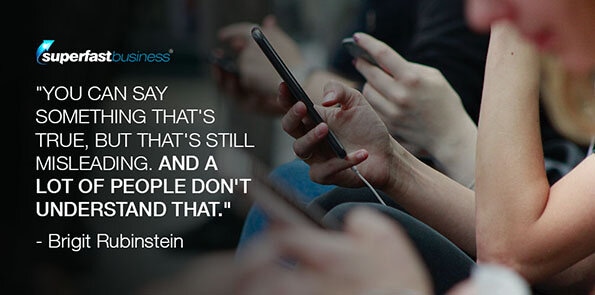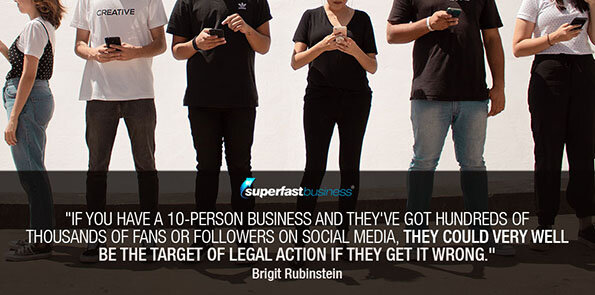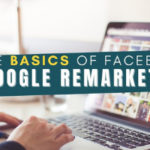It's no secret social media is a powerful marketing tool. But what many business owners don't know is there are certain legal basics to social media marketing that need to be followed for business protection.
In this podcast episode, lawyer Brigit Rubinstein discusses the most important legal considerations when using social media for marketing purposes.
Podcast: Download (Duration: 39:52 — 36.6MB)
Get Notified Of Future Episodes Apple Podcasts | Spotify | Amazon Music | Android | Blubrry | Gaana | TuneIn | Deezer | Anghami | RSS | More
In the podcast:
02:03 – Why legals are important in social media. Yes, there are laws involved.
03:45 – Are you aware of these things? Ignorance can get you in trouble.
07:37 – When are you guilty of being misleading? It’s not as simple as lying.
11:38 – How these laws translate in the US. This is how social media legals work in the west.
13:35 – Allegations and fake testimonials. These are some of the no-nos.
17:14 – At what point should you see a lawyer? When your business gets to this size, it’s time to protect your business.
19:43 – On incentivizing reviews. Discover what’s okay and what isn’t.
22:21 – Do you let people know something is sponsored? This is the kind of transparency a lawyer recommends.
29:07 – Sifting through some of the legalese. Just so you understand things better…
33:51 – Why it pays to get trademarked. You can learn something from James’s experience.
37:28 – What you can do after listening. Here’s how you benefit from today’s episode.
Let James help prepare your business for success
If you’re like many business owners, you do a fair bit of promotion on social media. And like many business owners, you may not know there are legal aspects to social media marketing.
With that in mind, James has invited lawyer Brigit Rubinstein to share her expertise in that area and give you the basics you need to protect your business.
We’ve had legal experts previously on the show, and James considers legal counsel an essential part of business, like a good accountant. Today’s topic, however, is somewhat new territory.
Why legals are important in social media
Two decades ago, social media was not a thing. Now, however, at least half the world’s population is on it, and what you do and say online can have significant consequences for your business. James knows of at least one store whose customers abandoned it because of a single comment they made on social media.
Especially in the last two years, he’s observed, people are more on edge, which makes it easy to get into trouble. So knowing what is and isn’t acceptable can give your business some amount of security online.
Are you aware of these things?
From a social media legal perspective, what things should today’s business owner be aware of?
Aside from its incredible reach, says Brigit, what distinguishes social media from traditional advertising is this strange, intimate feel to it. That is where she thinks a lot of the complexity comes in.
 There needs to be more transparency on social media, so that consumers aren’t manipulated by the sense of intimacy and authenticity. So really, in terms of social media marketing, the principles are much the same as with traditional advertising. And primarily, those are the principles in the Australian Consumer Law.
There needs to be more transparency on social media, so that consumers aren’t manipulated by the sense of intimacy and authenticity. So really, in terms of social media marketing, the principles are much the same as with traditional advertising. And primarily, those are the principles in the Australian Consumer Law.
The two core principles are, basically, don’t mislead and deceive consumers, and don’t make false statements or representations about your products and services. The important part is understanding how to apply those principles in social media, because it’s not always very clear.
When are you guilty of being misleading?
It would seem like a core human understanding, says James, that you shouldn’t mislead people.
Brigit agrees, and she wants to say that in most of the instances she’s encountered where consumers have been misled, it hasn’t necessarily been a deliberate attempt to lie to customers. It’s more often been a misunderstanding of the law, and a lack of knowing how you actually apply those principles.
 It’s not always obvious, she says. You can, for instance, say something that’s true, but that’s still misleading. And a lot of people don’t understand that. For example, if you left out an important part of a sentence, resulting in a half-truth, that could be misleading, but you may not have intended to mislead consumers.
It’s not always obvious, she says. You can, for instance, say something that’s true, but that’s still misleading. And a lot of people don’t understand that. For example, if you left out an important part of a sentence, resulting in a half-truth, that could be misleading, but you may not have intended to mislead consumers.
Then, says James, there is the matter of comments, like the vitriol that advertisers can draw to themselves on certain platforms. What has the law got to say about defamation and libel?
In relation to third party comments, there are two areas where Brigit thinks it’s a concern. First is, are you liable for defamatory comments by third parties on your social media pages?
There was one high court case where news stories about an individual, Viola, drew defamatory comments from readers on the newspaper pages. Viola took the media publications to court for defamation. The question put before the court was, could a newspaper who had not written those comments, had nothing to do with those views, and didn’t endorse them, be held responsible for defamation from third parties?
The court did not find the newspapers liable for defamation, but found that they could be seen as publishers. And an owner of a social media page, commercially benefiting from the engagement that comments fuel, cannot deny responsibility when those comments become defamatory.
They have a number of options. They can disable comments. They can disable comments and vet them before publishing them. They can moderate frequently.
The case was groundbreaking in that it was the first time a website or social media page owner was found liable for posts that they didn’t know about. The second half of the judgement, which will say whether there’s also a defense to the claim of defamation of innocent publication, is yet to come, but the case is a big wake up call to social media owners.
The second element is whether a page owner is responsible for misleading and deceptive comments on their website. This has been clearly answered. Say you make a product that treats allergies, and some consumers comment on your page that it also cured their asthma. If you have no therapeutic basis for that claim, you must remove those posts, or be liable for misleading and deceptive comments to consumers, for which there are hefty fines.
How these laws translate in the US
How does this translate to the US law, asks James? The US is known to be really harsh on medical claims and financial claims.
Australia is very much in line with international standards, says Brigit. Just recently, ASIC led criminal and civil charges against a travel insurer and underwriter who made potentially misleading claims about their travel insurance products. ASIC sued them in civil court and got 1.5 million damages.
The insurer was also ordered to pay back customers who had been misled into purchasing their travel products. Then ASIC led seven criminal charges against them for making false and misleading claims, a penalty of potentially up to $17 million or more.

Bear in mind, too, says Brigit, it’s not just big corporations that are in the firing line. Especially on social media, a lot of small businesses have significant reach, and the regulators will look at that. If you have a 10-person business with hundreds of thousands of fans or followers on social media, they could very well be the target of legal action if they get it wrong.
Allegations and fake testimonials
James has seen ASIC take legal action against a celebrity chef whose promoted product claimed to do something that couldn’t be proven. There are food bloggers who fake injuries or illnesses. There are Go Fund Mes set up with no real purpose.
And in the online space, a lot of sites have fake testimonials. James has seen people present from stage, whose products changed through the years but whose testimonials stayed the same. One person admitted to James he’d made his testimonials up.
There’s been a history of court action taken against parties for fake testimonials, says Brigit.
She tells about the Meriton Hotel, for instance, that tried to manipulate customer reviews. They’d doctor the email addresses of potentially unhappy customers, and send TripAdvisor the valid addresses of only happy customers. The regulator found out, and the ACCC took them to court. They were found liable, charged a couple of million dollars in damages, and suffered significant harm to their reputation.
At what point should you see a lawyer?
As a business owner, James has legal disclaimers, terms, conditions, privacy policies and the like, all done by a proper lawyer. Some people skimp on these in the early stages. But next thing you know, they’re making a few million and have yet to speak to a lawyer. What is the go-to minimum at which Brigit recommends getting protection?
For bootstrappers without the funds, says Brigit, the ACCC website is a wealth of information on all of these things, on testimonials, on reviews, in terms of what the expectations are from the ACCC, who regulates them, and the Australian Consumer Law. This includes how often you have to moderate your website, and what is expected of you before they find you liable for having written or published a comment.
“A defamatory comment or a misleading comment should be dealt with almost right away after being posted.”
The ACCC says there’s two key things to look at. First, the company size. A big company should be monitoring the comments after every single post. They expect you to monitor the social media pages seven days a week, 24 hours a day. And with a company that size, they ultimately expect that a defamatory comment or a misleading comment should be dealt with almost right away after being posted, if not before, doing moderation.
Second is reach. Say you’re a very small company but have very wide reach, the ACCC will expect you to have resources that allow you to pick up almost on a twice daily basis if there are any problematic comments.
In terms of testimonials, reviews, and the like, says Brigit, you should really have a comprehensive social media policy. This is not just for yourselves, and your employees, but also for people visiting your site – they should be made aware what is and isn’t acceptable on the website.
On incentivizing reviews
You’ll hear of people gaming the system, says Brigit, but a lot of what she encounters is more ignorance than malice, like people in business groups whose mates will leave positive reviews to counteract a bad one. That’s actually illegal, it turns out.
On that note, says James, a lot of people pay for reviews.
“Don’t just incentivize people you think have loved your services, you’ve got to make it an incentive for either a good or bad review.”
A no-no, Brigit says. But you can incentivize people to provide reviews. The key is offering everyone the same incentive. Don’t just incentivize people you think have loved your services, you’ve got to make it an incentive for either good or bad reviews.
So you could say, Have a free Margarita at our bar for an honest review of your experience at our hotel tonight. And best practice would then be to disclose that under the review by saying, our guests received a free Margarita for their honest review of their experiences. Then you’re covered, and you may still get those positive reviews.
What if people delete the one-star reviews?
Classic, misleading and deceptive, says Brigit. It’s a breach of Australian Consumer Law.
James doesn’t incentivize testimonials. What he does is send out a net promoter score, and a follow-up email. If someone replies with particularly good feedback, he might invite them onto the show, or ask permission to quote them on the website.
That, Brigit says, is absolutely okay. What James is doing is investing in customer satisfaction in a genuine and real way, and then telling people about their experiences.
Do you let people know something is sponsored?
James does a lot of podcasts with case studies, and calls them case studies. He also has a page recommending products, with a disclaimer that he could make an income from it.
He’s noticed too that a lot of social platforms give you the option to let you know if a post is sponsored or an endorsement.
There is a code of conduct to the advertising, says Brigit, the AANA, which is Australia’s advertising authority. Their sort of golden rule is you must disclose when content is sponsored. There are no legal penalties if you don’t comply with it, it’s purely voluntary. But if you breach the code, what they will do is name and shame.
James goes through some effort to be transparent. People know when he has partners on the show, and if they get in touch with that guest it will be good for everyone. But roughly 85 percent of his content doesn’t involve partners, like this episode.
Sifting through some of the legalese
It will probably help listeners to translate some legal terms they might come across.
Say for instance, you have an unhappy customer you couldn’t help. They ask for a refund and you offer to return either part or all of their money, “without prejudice”. What does that mean?
Brigit explains: Without prejudice means, I’m going to give you this, but you can’t hold it against me at a later stage and say, Look, you must have been in the wrong because you did the partial refund.
Basically, says James, it’s not an admission of liability.
What about when he uses the words, “It’s my opinion?” Why would he say that?
Two reasons, says Brigit. First, you want to make it clear you’re not stating a fact. So if, for example, you were sued for defamation, one of your defenses might be that it was your honest opinion based on reasonable facts.
Two, you want it to be clear that you’re not necessarily making a recommendation to everybody to do X. It’s just your opinion.
Now, why do the news agencies use the words “alleged” or “allegation?”
Brigit says they want to make it clear that nobody has actually yet been found guilty or liable for anything. It’s just, at this stage, someone said that someone did something. It’s nothing more than that.
James is interested in the fact that many people in his industry affiliate, but what they don’t realize is, if they have their own affiliates, they’re most likely liable for the affiliate’s claims.
You are definitely liable, says Brigit. If you have some element of control over the whole process, and it’s your product that’s being promoted in some way, there can definitely be potential liability.
James will use another legal term. He found quite a few of his affiliates were “passing off”. What is that in layman’s terms?
“Competition is inevitable.”
Competition is inevitable, Brigit says. Most of us understand that you can’t protect a business idea. But if someone makes their product look so much like yours, through copying your marketing material, or your social media, through the packaging, or through the product itself, if they copy it in such a way that consumers are going to be confused between the two products, they are passing off their goods as yours.
Some people would do this, says James. Some would take images directly from his website and put it on theirs. Now, some of them were actually his own affiliates, selling his stuff, but not disclosing they were an affiliate, and people would think it was his site.
Why it pays to get trademarked
James has had SuperFastBusiness and SilverCircle and his surf brand trademarked, because he’s had to tell people not to use his name. But what he failed to do years ago was protect himself in the UK market. British Telecom set up their superfast internet divisions, and they registered SuperFastBusiness.co.uk. They were running events and building on YouTube and social media, and starting to drown out James.
Because they’d beaten him to trademark, James could only wait till they moved on to something else, which they eventually did. But for a while there it was painful.
Several lessons, says Brigit. One, register your trademark in all the countries you plan on doing business. You don’t have to wait until you’ve actually started trading in that country. You just have to have an intention to do so.
When it comes to passing off, there are remedies under the Australian Consumer Law. There’s copyright infringement, if someone copies your website content, your images, or any of your marketing material.
And it can seriously damage your reputation if some arbitrary person is selling inferior services or products under your name. The damage is potentially very significant, especially if, as in James’s case, you are the brand.
What you can do after listening
What would Brigit suggest listeners take away as an action step from this episode?
What people can do, she says, is educate themselves as much as they can about social media marketing, and a really good place for them to start is the ACCC website. Once you’ve got those basics, if you are ever going to start a business, if you’re going to produce a lot of marketing collateral, she would definitely suggest consulting a lawyer in that space, to make sure your foundations are really solid.
Get it right to begin with, and you can avoid receiving a cease-and-desist letter, shutting down your business and starting over.
At Brigit’s website, leveluplegal.com.au, they have a lot of blog posts, in plain English, specifically for businesses and startups that are trying to understand their obligations around marketing, trademarking, copyright, all of those matters.
If you’ve got a question for Brigit, or would like her back to delve deeper into a subject, reply to one of James’s emails and let him know.
Join a thriving community of your business peers inside JamesSchramko membership
Liked the show? Leave us a review on iTunes









Leave a Reply